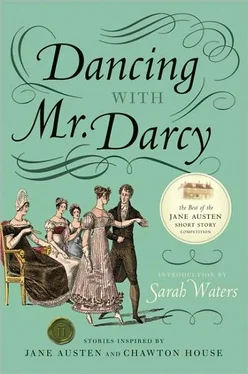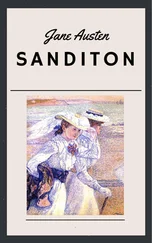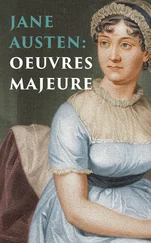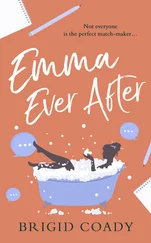Now all was settled between them. Watching him leave the room, she could read his satisfaction – his relief – in the spring of his step. Were he to leap up and click his heels together, she would not be entirely surprised, for he must be pleased that he had brought it off so well, as truly he had.
He was a stout young man turned twenty-one, just down from Oxford, wearing a striped silk waistcoat – a puce-and-purple striped waistcoat – poised to commence life as a gentleman of means, if not fashion. Was ‘poised’ the proper word? Was ‘poise’ indeed possible for Harris Bigg-Wither, a young man in a puce-and-purple striped silk waistcoat, and evidently in need of a wife, or persuaded that he was?
And now promised a wife: yes, I will.
Did he truly know what he was letting himself in for, she wondered, by offering for Miss Jane Austen? Had he no notion of the glint of irony lurking in her eye, the sharpness of the tongue disguised by the amiable, good-natured manners that she presented to the world? His sisters must have: they had known her forever. Alas, not even his sisters had seen the jottings that Cassandra – Cassandra alone – had read, the idle, wicked musings on the friends and neighbours whose antics she had observed with such shameful enjoyment and described with such relish to her sister. But he must know of the pages tucked into her writing slope which she sometimes read to friends, images of that other world that flashed in her restless brain, a world of handsome young men with clever conversation and fair young ladies who danced with them in The Dashing White Sergeant or the figures of another of the country dances that could so nicely set her free – briefly – of the conventions of her company.
She tried to recall dancing with Harris Bigg-Wither and could not.
It is done, she thought. No crying off.
Her poverty – this new sense of poverty since Papa had ceded his livings to brother James, this humiliating dependency upon the generosity and the whims of others – the indignities – the little slights – the necessary economies – all those would cease when she was Mrs Bigg-Wither, mistress of Manydown Park, an estate comparable – almost – to Godmersham, brother Edward’s principal seat. No longer Miss Jane Austen, a dowerless spinster of twenty-six, but Mrs Bigg-Wither, wife to a gentleman of means – seven thousand pounds a year! A considerable man, however young, however shy, however blank his eyes at times, a friend, an old friend, comfortable, with no meanness in him that she knew. The five years between them would be as nothing – had not brother Henry and cousin Eliza, fully ten years his senior, dealt happily together?
Had Harris attended to the passage she had read to the Manydown circle two nights before about the serious business of annuities? He had nodded, had he also smiled?
No need for Mrs Bigg-Wither to mend or patch her ageing boots or pelisse as they became worn; she could replace or discard them on a whim if she wished. What pin money she would have! Her time would no longer be at the mercy of others – only his, of course. Yet husbands might be managed. Everyone said so. She would learn the way of it, just as Mama had managed, and dear, good Papa had allowed it, and indeed there was still abundant affection between them.
What was it Papa had said of a marriage without affection?
No more requests – demands – to mind a child or fetch a shawl; no one, save her husband, of course, to rule her time. She must find a place at Manydown to write, a snug, quiet spot such as eluded her in the rooms at Bath where she and Cassandra now lived with Mama and Papa. No more mending and darning; perhaps some pretty needlework, but only if she wished it. Music. Manydown had a fine pianoforte. Yet, there would be the duties of a chatelaine, of a wife, indeed of a mother.
A mother.
She had felt nothing when Harris’s hand touched her sleeve. His lips pressed dry against her cheek. She had no impulse to embrace or touch him.
‘A marriage without affection can hardly be an agreeable enterprise.’
She would come to live among friends at Manydown, Elizabeth, Catherine, Alethea, the Bigg sisters, good girls, dear girls, if not clever; but they were friends, dear friends throughout the golden Steventon years. Good to her, wishing her only happiness. And Steventon, dear Steventon, so near, still home, always home, even with James and his brood occupying the parsonage.
Where amongst this lively, noisy family of Biggs and Bigg-Withers could solitude be found, a place and time to retire, to reflect and, yes, record?
Mrs Bigg-Wither of Manydown would be an instrument to relieve the trials of her parents and sister. She would be the heroine of her own bright tale. Cassie could live with them much of the time, just as she stayed often at Godmersham. And she, Jane, could advance the careers of the Austen sailors, Frank and Charles, and perhaps even poor, dear Henry whose enterprises – well, clever, charming Henry always found a way, did he not?
She must feel a kind of affection for Harris Bigg-Wither. Surely she could learn such affection. She had made a sensible choice, a comfortable choice; a choice for comfort. Nothing could be said against the suitability of the match despite the five years longer she had lived than he. The most critical of friends or neighbours in Steventon or Bath or even those at Stoneleigh, from whom much was expected one day, could not but approve her choice. It was a wholly practical decision, a decision greatly to her advantage, indeed greatly to the advantage of the entire Austen family. Through this alliance, she would be elevated from genteel poverty as a retired, landless clergyman’s second daughter to a most enviable situation in society, comparable – almost – to that of sister Elizabeth Bridges, brother Ned’s Elizabeth, whose dowry had so nicely enhanced the stature and fortune of that already most fortunate of the Austen brothers. A fine match indeed.
Why, therefore, with all the advantages of the match enumerated, does she suddenly feel a dull, heavy weight descending upon her shoulders? Why a throb of dry pain in her throat and a pressure behind her eyes? From whence come the tears stinging inconveniently behind her eyelids, threatening to flood the room? Why this sudden revulsion of feeling?
Not fair! Not fair!
Oh, Jane, you must embrace your fate, stifle your tears and hold your errant tongue. You must thank providence for your good fortune, come not a moment too soon, for at six and twenty, you are rescued and shall be elevated simply by speaking those few words: ‘Yes, yes I will.’
She will bask in Mama’s approval, in Papa’s relief. Cassandra shall be made secure, James and Henry, even Ned, shall be relieved of her future care, and she shall be transferred from one dependency to – a kind of freedom. Perhaps.
Children. There must needs be children, and not the children of her fancy – Susan, Lizzie, Elinor, Marianne – but children of solid flesh and blood, and tears.
No time for regret, for here are the Bigg girls come into the library to embrace her as a sister and congratulate her, all smiles, on her good fortune. Cassandra, too, is here, holding back just a trifle, perhaps questioning without words, perhaps sensible of the turmoil in her mind and heart, yet not disapproving.
All of them, sisters to bride and groom-to-be, had colluded in bringing about the encounter between Harris and herself, a private moment for which poor Harris had been primed, as had she. Against such a confederacy – a campaign so kindly intended – how could the principals, so beloved of the conspirators, venture resistance?
‘You will see how he has improved since he came down from Oxford,’ she had been told. ‘You will observe his gentlemanlike manners, the marked improvement in his address. So tall, so much slimmer now, so much neater in his person. The stammer – why, in your company, dear Jane, in the company of a friend with whom he is so comfortable, hardly a stammer at all. And with your good sense and fine taste, his improvement cannot but continue. Clever puss, you will change him, Jane, indeed you shall.’
Читать дальше












